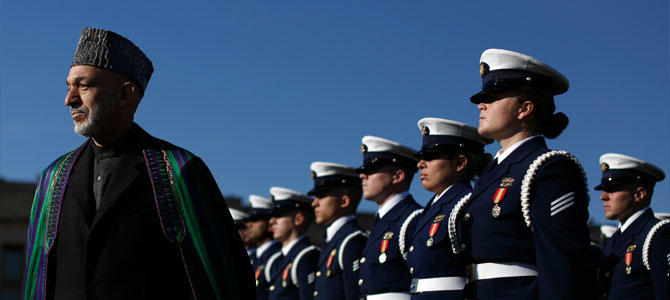With the unseasonably warm weather in Washington this week, you’d think the tulips were out, considering how officialdom is tiptoeing around the subject of Afghan President Hamid Karzai’s visit to confer with President Barack Obama on Jan. 11.

Such meetings have been tension-filled before. This one is particularly critical because decisions about future relations between the two countries are still “very much in flux,” Andrew Wilder, USIP’s director of Afghanistan and Pakistan programs, told National Public Radio. The visit also is being watched closely in Kabul, where Wilder learned on a recent visit that Afghan elites are anxious about the outcome of the meeting.
"That whole dynamic within Afghanistan is generating concerns that a meeting that doesn't go well could lead to a decision to bring home the remaining U.S. troops more quickly than I think most Afghans feel comfortable about,” Wilder told NPR in a Jan. 8 article on its Web site and the accompanying radio broadcast. “They're worried that could be politically destabilizing," he said.
Media outlets have reported this week that continuing tension with Karzai, especially over the terms of the security agreement that will govern the nature, form and legal protections for any continuing U.S. troop presence after 2014, might result in the full contingent of American forces being withdrawn entirely. The U.S. military has pressed for a continuing troop presence that would allow training and logistical support for Afghan security forces as well as counter-terrorism operations against potential militants who threaten the U.S.
Marine General John Allen, the top U.S. and NATO commander in Afghanistan, submitted options to leave 6,000 to 20,000 American troops in the country, a range the Pentagon later changed to between 3,000 and 9,000 to conform with White House requests, the New York Times has reported.
“Both sides have tried over the last year or so to make an effort to warm up relations,” said former Ambassador Omar Samad, USIP’s Afghanistan senior expert in residence, in an interview with Canadian Television (CTV). Tensions have erupted in the past over alleged corruption in Karzai’s government and the Afghan president’s criticism of the U.S. over civilian casualties and sovereignty issues in military operations.
Those stresses are likely to take a back seat during the talks this week in Washington, said Samad, a former Afghan ambassador to France and Canada. Rather, the discussions will focus on the speed of the U.S. and NATO troop drawdown, prospects for reconciliation between the Afghan government and the Taliban and how the U.S. will help Afghanistan after most, if not all, foreign forces withdraw in 2014.
“I think there’s still a chance to save the day, to put Afghanistan back on track, to turn this into some sort of success for all those who contributed, to make sure the sacrifices are not in vain,” Samad told Olive Branch.
Both sides will come with specific policy and strategy demands.
While Karzai is looking for pledges of extensive aid, including military supplies and equipment and continued training for the Afghan National Army and police forces, Obama is likely to emphasize the importance of a credible election in 2014 to choose a successor to Karzai as a virtual precondition for significant external economic and security assistance to continue to flow to Afghanistan.
What’s your bet on which direction U.S.-Afghanistan relations will go after this week’s presidential summit?
Explore Further
- Adviser to Afghan President Karzai, an Ex-USIP Fellow, Confers with Institute Staff
News Brief by USIP Staff



